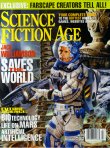Eight Stories for March 2000
These reviews by Locus Online editor Mark R. Kelly are adapted from his column in Locus Magazine.
|
|

David Marusek, ''VTV''
(Asimov's March 2000)
VTV is a news network that both broadcasts stories -- especially live unfolding crises -- and serves news to a database that viewers access through layers of computer-like drop-down menus. The network's live coverage converges on a local member of an international tourist group whose other members have just been assassinated. The reporters can't interfere -- that would be 'making' the news, not covering it. Marusek's story is an indictment of journalistic ethics, as well as a riveting, tense story with a climactic surprise that illustrates how the arms race between those who cover the news and those who would manipulate its coverage will necessarily escalate as a consequence of new technology.
Tom Purdom, ''Romance in Extended Time''
(Asimov's March 2000)
A 21st century Casanova, Joseph Baske, offers his services to two women recently arrived on Mercury to participate in a crucial vote of the All-Mercury Coalition of Documented Creative Specialists. Their journey takes them through a 3 km high, 20 km wide greenhouse that encircles Mercury's globe, where they meet various obstacles. Purdom combines exotic adventure with satire (of certain writers' organizations, perhaps) and a thoughtful portrait of a 21st century where genetic modification has brought about virtual immortality, and new generations are measurably better than each one before. Ninety-year-old Baske's realization of just what this means to young people -- more aware than he of the sense in which they face obsolescence -- is the key insight of this colorful, multi-dimensional story.
Michael Swanwick, ''Moon Dogs''
(Asimov's March 2000)
A man leaving a peculiar health spa -- where ''for a fee, they would drown you as often as you liked'' -- meets a woman who lives in the woods with her mechanical gundogs for protection. He learns that her family was killed by religious fanatics in strange retribution for fear of humanity's extinction from plagues, diseases once thought contained but which re-emerged. The theme of how people react to fear, and the realization that life is never perfect, underlies a tight, precisely written story with surprises that are substantial and memorable.
§

Stephen Baxter, ''Saddlepoint: The Children's Crusade''
(Science Fiction Age March 2000)
The conclusion -- or at least a conclusion -- to the series of stories run in SF Age about astronaut Reid Malenfant and his involvment with mysterious aliens called the Prion. (Malenfant also appears in Baxter's novel Manifold: Time -- see January Book Selections.) After trips through the saddlepoint gateways linking Earth to other planets, Malenfant finds himself on a starship headed toward the center of the galaxy, where a Prion representative explains big secrets of life and the universe. Like, why has no lifeform ever lasted long enough to establish a galactic-wide civilization? Baxter, one of the best current hard SF writers, plausibly addresses big mysteries about the nature of the universe.
Brian Stableford, ''The Last Supper''
(Science Fiction Age March 2000)
In Europe especially there is great controversy over genetically modified food. Stableford extrapolates this development to a depiction of a dinner date at a fancy restaurant run by celebrity chef Jerome, whose meals are works of art. While picketers protest outside, and the man nervously works up the courage to propose to his date, Jerome makes an appearance with a surprise announcement. The story is a example of SF that takes a headline from today's paper and explores its ramifications with thoroughness, humor, and charm.
§

Sean McMullen, ''Colours of the Soul''
(Interzone February 2000)
Solid extrapolative SF that depicts a world afflicted by a virus that enables people to see UV light. A consequence is a form of telepathy via UV patterns on the skin of the face that reveal thoughts. People can avoid the effect if they wear special sunglasses, but unwitting telepathy has wreaked worldwide havoc and led many to commit suicide. The story follows a traffic control worker as news is revealed of the source of the virus. The story goes a bit overboard at the end, but its exploration of the ramifications of its central idea are insightful: the kinds of secrets people would rather die than reveal, for instance; and the ironies observed in the life-decisions people make as a result of such secrets.
Zoran Zivkovic, ''The Window''; and Liz Williams, ''Dog Years''
(Interzone February 2000)
Two intriguing parables about death. In Zivkovic's, a man's dream of dying leads him to an elegant study where a clerk offers him a choice between a second life as another person (or any plant or animal), or looking out of a special window, a realistic painting of a blue sky. In Williams's, a dying young girl is given new life by ghosts who ask in return permission to borrow her body periodically, to see through her eyes.




